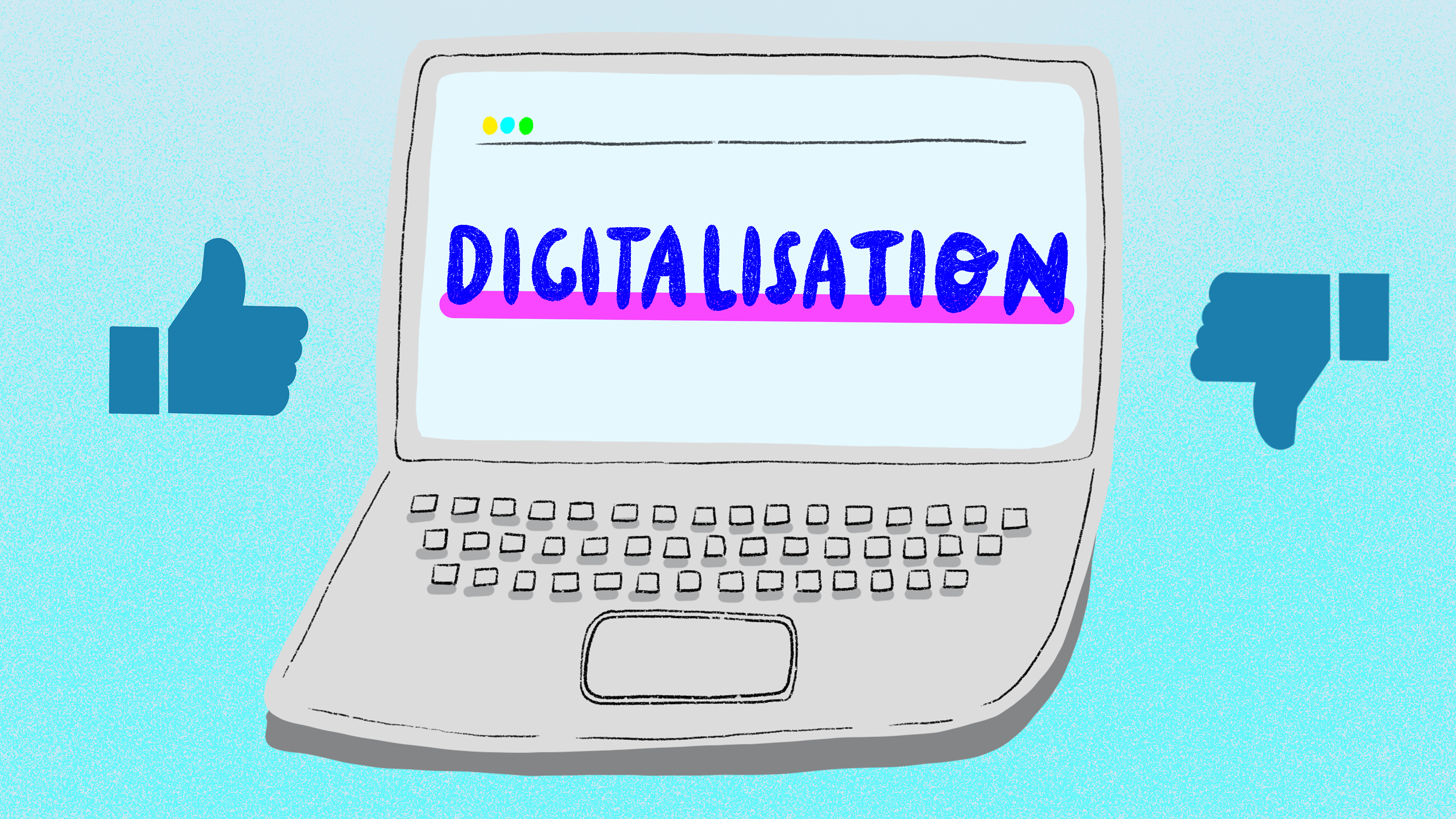
Illustration by Daniela Nunes
Digitalisation of our lives: good or bad?
by Meelika Hirmo
I bet you have already tried out artificial intelligence (AI) generated avatars. Maybe you have played around with AI, creating art pieces or, maybe you won’t admit it, you have written an essay for school using AI. In the European youth field, we have been hearing jokes about AI writing better Erasmus+ project applications than us humans, for a while now. Writing this, I am almost sure the term “digital transformation” is not new to you. We all read about social media giants being accused of mistreating our data. Terms like fake news have been around for a while. So have the stories about surveillance of citizens for political or economic control or the rapid spreading of cybercrimes. It all can sound a bit like a new season of “Black Mirror” or “Alice in Borderland” on Netflix, except these scenarios are closer to reality than some of us think. Especially considering that the first episode of “Black Mirror” was released more than 10 years ago. A lot can get worse in 10 years, right?
At the same time, the development of technology and digitalisation have created endless opportunities to make our voice heard, to get to know people from all parts of the world without even leaving our bedroom. Technology allows us to get our yearly taxes done in 2 minutes or vote in elections while living the life of a digital nomad in Bali.
So, what’s the real story with digitalisation in our lives? Are we witnessing doomsday or is this just a growing pain of a young digital society? I got in touch for an interview with Anett Linno who works at Citizen OS, an NGO founded in Estonia (known for its e-government) which has spread internationally. Anett explains that at Citizen OS, their mission is to promote civic participation and a better decision-making culture online. But wait! Good decision-making culture? Online? I think for most of us “online discussion culture” recalls anonymous toxic comments, hate speech, objectifying of young girls and 12 seconds of attention span. Maybe, talking to Anett will bring some silver lining – let’s see.
When we talk about digitalisation, what are we talking about, really?
Anett Linno: I would approach it through evolution. I think today, as a society, we have reached the milestone of becoming a global network which creates a fertile ground for almost unlimited interaction and more ways to co-operate than ever. I see digitalisation as a stepping stone for a society which can be focused more on co-operation, not so much on competition as it has been before. At Citizen OS, we carry the mission of using technology to bring together diverse groups of people and various communities to empower discussions and decision-making processes where participants respect each other and promote argument-based communication.
Digitalisation has been blamed for generating toxic culture. Hate speech, shortening of our attention span, false information, radicalisation and polarisation – all this, thanks to technology, is now spreading faster than ever. Is technology the cause of all this?
Anett Linno: Well, I see our online discussion culture only at the beginning of its evolution. To me, considering other major technological or evolutionary happenings in human history, it’s not that scary or bad. It is part of the natural process we are going through. We have been experiencing immature ways of living online and have been abusing it partially but I think we are now entering the time where we will think more analytically about our digital image – about what kind of digital citizens we are and what kind of digital citizens we want to become. I believe we are moving towards better online communities and better decision- making cultures. The fact that in more and more countries, pupils and students are receiving this knowledge as part of their curricula, also gives me hope and assurance that we are improving.
That is all very optimistic but we are assuming here that people want to participate and discuss. That’s not always true, is it? Many people are happy to give away some of their decision-making rights to just not have to think about so many things and live a comfortable life. Studies show, democratic space is shrinking everywhere.
Anett Linno: “True, but I don’t think this is a matter of digitalisation. Throughout history we have seen societies going through these choices. In a way, it is indeed quicker and easier to make decisions if there is only one person or a small group who makes them. It requires less effort from citizens. However, what is the price of it? How far are we willing to let go of our rights as citizens, as humans? Here again, it’s a matter of education and question – do we acknowledge that we have the right and the obligation to speak up for ourselves? I don’t think that every person has to actively participate in every decision-making process, but we should be qualified and interested in influencing the decisions impacting us.
If you ask, why debate and discuss in the first place, it’s simple and proven – a pluralistic view to common challenges and respectful ways of discussing topics brings better results for the entire community. This is why it is essential to bring together various views, perspectives and experiences. It gives us an opportunity to get a better understanding of the problem we’re trying to solve. Here, technology can help us. Digitalisation makes it possible to reach out to and bring together more people from various locations and backgrounds. We are no longer limited to geographical locations, for example. Many discussions in our globalised world will be more fruitful and quality if they take place on an international level. Taking environment and sustainability as an example, we realise that as the climate crisis is a local and global issue simultaneously, wide-scale understanding and co-operation is essential here. It is much more feasible to hold such global and big topical discussions online than to try to get so many diverse people together physically.
Sure. However, do you agree that there is a big shadow side in digitalisation?
Anett Linno: “Absolutely, but isn’t this true with all topics? When I think about technology and digitalisation, I see that in its essence it is neutral. The nature of technology depends on the creator and its users. That’s why it is important to have critical thinking and develop media and information literacy, including digital skills. It is true that the data collected about us, which we are so easily and willingly sharing, can be used to manipulate or influence on an economic and political level. We also see that there is still a gap when it comes to digital lives of various communities. There is a lot of inequality caused by factors like access to electricity, internet or technological tools ending with lack of skills and understanding of digital life. Even within Europe, there is a digital gap we must consider.
The biggest asset with digitalisation in democracy is the opportunity to bring together more people and initiate discussions and influence decisions. I also think the trend is that people will have more time at hand. You hear the discussions about 6-hour work days or 4-day work weeks which is not possible for everyone, but becoming reality for more people than ever.
Of course, there is the big problem with information disorder – the overload of information, false information, manipulation, digital gap, digital safety of people, etc. So, it is true that the risks and problems go together with positive aspects and opportunities.
How will digitalisation influence our democracies and political participation?
Anett Linno: “In our Western democracy, there is a substantial lack of engagement of interest groups and citizens. The current democratic process in the majority of the Western world has been built on deliberative democracy, which means that we vote for someone who then makes decisions for us for some period of time in almost all areas of our lives. This way of democracy in its principle has been unchanged for hundreds of years, or even longer – from the time of ancient Greece. It does not fully reflect the modern world anymore. Life has become more complex, changes are taking place quicker. I believe that in future democratic participation will become more multilayered, taking place both online and offline and combining deliberative and direct participation methods. I think democratic societies will have to go along with digitalisation and digitise their services. Of course, this would not mean that physical services or ways of participation would disappear. They would coexist. All these developments will bring new ethical and legal debates about when, how and what should be done when engaging people in decision-making processes.
Even though technology can give more access to more people whose lives decisions will impact and hence invest in better and more fair decisions, risks remain. For example, you can follow all the right steps and appear very democratic but come up with a horrible decision. There’s no simple black-and-white scenario here. It’s not a matter of technology again. It’s the question of motivation of a person or a group and the awareness and education of citizens. Populism, manipulation, and low political awareness is and remains a risk. This is why investing in people’s interest in civic participation improving their critical-thinking skills is fundamental. All in all, we can’t predict the future. We don’t know for sure how changes in one field will affect realities in another aspect of our life.
Is digitalisation somehow more important for youth than for previous generations?
Anett Linno: “Yes and no. The fact is, that based on what we can predict, digitalisation is here to stay and evolve, and this means it’s not just something that’s important to youth but it’s important to everyone. As the younger generation has grown up with technology and they will keep shaping its development, then of course their role is very important. What type of digital society will they develop? Will it be more fair than the current one? They will be the ones making new rules and potentially breaking the old ones. This brings the challenge for the previous generations who will have to adapt to what might be a very different way of doing things. The risk is that we end up with a bigger digital and generational gap resulting in more polarisation. However, I’m optimistic and believe the younger generation will build on the work done so far and improve on it. In human evolution, each generation has had their own unique responsibility and it’s affected by the generations before. What choices will be made, what problems will come along – I don’t think anyone can predict these very well. There is one thing I’m sure of – respectful co-operation will bring better results and this is something we want to keep promoting, online and offline.
Digitalisation is one of the main themes of the Democracy Here | Democracy Now campaign.

Meelika is a communication professional working for positive social change in the field of democracy, environment and media and information literacy.


